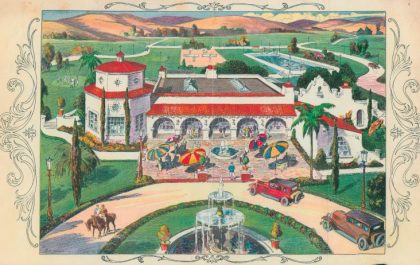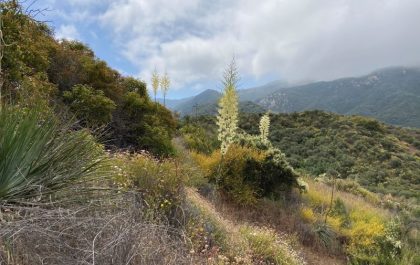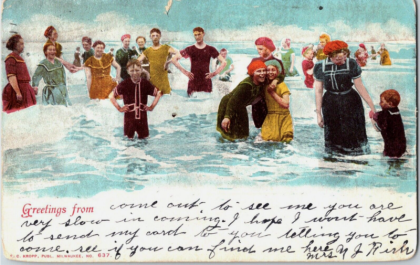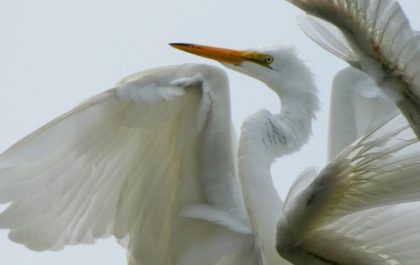
It’s Tuesday March 12, 2024 and I’m three miles up a steep dirt road a bit northwest of Bisbee, Arizona in a dispersed camping area designated by the Bureau of Land Management. While on the road for about two weeks, Bisbee was only the second spot I intentionally planned to visit; while other stopovers were determined by mood, weather, and circumstance.
The first planned stop was Pancho Villa State Park in Columbus, New Mexico, just north of the Mexican border. As it turns out, it was March 9 and the one hundred-eighth anniversary of Mexican rebel Pancho Villa’s raid into Columbus; meaning, for all intents and purposes, March 9 is the anniversary of Villa’s invasion of the United States. One hundred-eight years later, I was joined by budding Western historian and professional musician Dan Crow—who made his way to Columbus from his home in Las Cruces, New Mexico. We were witnesses to what this historical event means to the people who now occupy this space.
Rather than speak of military victories or defeat, the remembrances of that day seemed to dismiss the notion of some great power vanquishing another—because all too much of our history is this—but rather, the manner in which individuals can be drawn into conflicts directed by others.
My limited historical recollection of these events is framed by the larger story of nations; in this case, the impending entrance of the United States into The Great War (WWI) of 1914-1918. An intercepted communication from Germany, known as the Zimmerman Telegram, encouraged Mexico to attack the US in service of Germany’s interest in keeping America out of the war in Europe, which had been tearing apart that continent since 1914. How this played out in Columbus, New Mexico is now left to those that saw in Pancho Villa’s raid the clash of a variety of players probably little concerned with Europe; the Mexican government, Mexican rebels led by Pancho Villa, a host of Native American tribes, American Army Buffalo soldiers who had been patrolling the American Southwest since the Civil War, and eventually about ten thousand American troops sent to quash the violence.
Yes, the flags and colors of many of these groups were on display during the day of our visit. However, the celebration on this beautiful Saturday in March focused on honoring all who had participated, over any deference to unit, tribe, or nation. I was reminded of a photograph of elderly Japanese and American veterans of World War II embracing one another. I also thought of a short story about American GIs returning to Vietnam and breaking bread and drinking wine with those who had once been mortal enemies. During a formal tribute to the casualties, a cavalry-style parade, a visit to the museums, and then wandering among other celebrants, I was filled with the sense that, despite our many differences, those things that divide us can be overcome and understood in light of that which we all share. Saturday was a refreshing and inspirational day.
On Sunday, my mood soured a bit. As I towed my small camper west from Columbus, New Mexico and into Arizona, I was able to see broad stretches of a dark brooding wall to the south; a monolithic beast that screams “us and them” as it climbs up and down small slopes. It came to an end only after reaching mountains that apparently have been determined to be barrier enough to keep at bay the “huddled masses” of our American century.
Despite the serene desert landscape, and the crisp, cool air, the wall’s presence loomed over my thoughts. As I approached my second planned destination—Bisbee, Arizona—I was set upon determining which of several Bisbee drinking establishments most closely resembled my idea of “saloon.” As far as I can recall, I fabricated this plan after social media-clicking on something like “Top Ten Small Historic American Towns” where Bisbee was portrayed as a Wild West throwback.
Part of that plan included setting up camp at an RV park within walking distance of “historic” Bisbee. For good measure, I brought along my cowboy boots to make that short walk and hopefully, clack along a clapboard walk, swing in through saloon doors, and order a shot and a beer.
Fortunately for me, and before shelling out fifty bucks for a small gravel parking space and an electric outlet, I missed the turnoff to the RV park and ended up puttering along the narrow streets of Bisbee; trying to navigate my way while pulling a camper on roads not intended for such things.
As I searched for the signs that might help me correct my error, someone along the sidewalk hollered, “Wrong way, dummy.” I’m not usually bothered by such things but something inside me churned. I’d driven a long way to be among these people and their “saloons.” Surprisingly, my embarrassment morphed into something else altogether.
With no way to turn around for a few blocks, I continued to hear commentary from the sidewalk. As I rolled forward wondering what it might cost to engage in such dangerous and neglectful behavior, my streak of misanthropy kicked in. By the time I found a spot to turn around, I had completely lost interest in Bisbee, Arizona.
During my brief drive up and down a one-way street amid a day pondering the border wall, and all the misery just across the way, all I could think of was that Bisbee so resembled hundreds of other touristy spots across the country that, instead of backtracking to the RV park, I rolled west out of town and up the hill where I found the quiet BLM campsite. Once settled, I sat back in my lawn chair looking down at the dwellings that dotted the small valley and said out loud to myself, “if he’d only said, ‘wrong way, podner,’ I might have given the place a chance.”
This is why I bring along the books.
By the time I found myself perched above Bisbee, Arizona I had already finished the first two books in a series by Steve Martini, Compelling Evidence (1992) and Prime Witness (1993) featuring lawyer Paul Madriani. So enjoyable were these two—reading just like John Grisham’s legal thrillers—that I found the third in the series online and had it delivered to Jimmy P. Morgan, C/O The Bisbee Grand Saloon.” Someday I might drop by and pick it up.
Another delight in my traveling library is Michael Connelly’s latest Lincoln Lawyer novel, Resurrection Walk (2023), featuring both defense attorney Mickey Haller and his half-brother retired LAPD homicide detective Hieronymus “Harry” Bosch. This one is fun and relaxing; no surprise here because Connelly has never failed to deliver in over 30 years of developing these dynamic characters and others that populate the Bosch universe. In this one, Haller is coming off the euphoria afforded by liberating a wrongfully-convicted death-row inmate while Bosch serves as his reluctant and ailing chauffeur/investigator. Both of these characters defy stereotypes—of the greedy ambulance chaser lawyer and the burned-out and surly detective tainted by a corrupt and overbearing police bureaucracy—imperfect good guys going up against the man!
The true medicine for my surly attitude came from another friend of mine. On that Sunday evening above Bisbee, I settled in with Harbor Lights: Stories (2024) by James Lee Burke. In this amazing anthology of short stories, Burke explores justice and corruption, revenge and forgiveness, history and myth, perversion and decency, good and evil, hope and despair, reality and imagination, and all those other things that can be cobbled together to help us understand the human condition. In other words, James Lee Burke is a master storyteller and if you’re ever feeling down and can’t quite put your finger on the reason why, pick up the dang book… if only to remind yourself that you’re not alone.
If my words can’t convince you, let’s try Burke’s.
By midsummer the first shaft of morning sunlight in West Texas can be like a wet switch whipped across your skin. A sunrise in Wyoming was never like that. The light was soft and filtered inside the barn where we slept, the air cool and smelling of sage and woodsmoke and bacon frying in the cookhouse. You could get lost in the blue immensity of the dawn and forget there was any such thing as evil or that someplace down the road you had to die.
Bisbee, Frisbee…
*For more of my thoughts on James Lee Burke and Michael Connelly, see: Books & Such, Some Friends of Mine https://topanganewtimes.com/2021/06/04/some-friends-of-mine/











